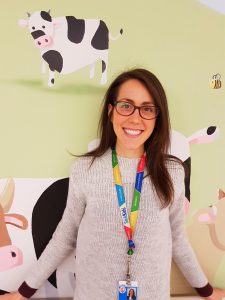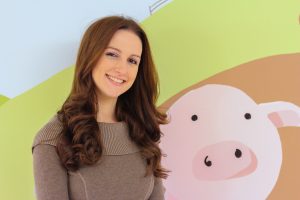Carmen McKnight
Clinical Research Project Coordinator
Communication Disorders
Phone: 416-813-6683
Email: carmen.mcknight@sickkids.ca
Carmen completed her B.Eng (2009) and M.A.Sc (2012) in mechanical engineering at Dalhousie University, where she focused on bone conducted sound and the three-dimensional vibratory response of human skulls. She joined the Cochlear Implant Lab in October 2014 and currently supports lab members in their stimulus delivery, data processing, and analysis tasks. She is also involved in the vestibular testing of cochlear implant users.

Christina Lavallee
Clinical Research Project Coordinator
Phone: 416-813-6683
Fax: 416-813-5036
Email: christina.lavallee@sickkids.ca
Christina completed her Bachelor of Arts (Honours) in psychology (2009) and Master of Arts in experimental psychology (2011) at Laurentian University, where she focused on binaural beat entrainment, as well as EEG features characterizing states of consciousness. She completed her PhD in Experimental Psychology at the University of Oldenburg in Germany (2015), where she used simultaneous EEG-fMRI methods to discern networks associated with response inhibition with the Stop-Signal Paradigm. Before starting at Archie’s Lab in May 2016, Christina did her post-doctoral research at the Center for Mind/Brain Sciences at the University of Trento in Italy, where she investigated neurophysiological mechanisms contributing to visual attention with the use of multi-modal EEG-fMRI recordings. Christina recorded and analyzed electrophysiological data with a variety of methods to identify brain areas involved in binaural hearing.
Stephanie Jewell
Clinical Research Project Coordinator
Phone: 416-813-6683
Fax: 416-813-5036
Email: stephanie.jewell@sickkids.ca
Stephanie Jewell graduated from the University of Toronto with an Honours B.Sc. in Psychology in 1999. She joined the Cochlear Implant Lab in 2007 as a Clinical Research Project Coordinator. Stephanie was directly involved daily in testing of cochlear implant users, coordinating Health Canada and FDA clinical trials and database management.
Awards and Honours:
- 2012 – SickKids Clinical Research Award
Alexander Andrews
Research Engineer
Alex contributed to Archie’s Cochlear Implant (CI) Lab in three main ways:
1. writing software to deliver stimuli and process signals for CI experiments
2. supporting lab members in their stimulus delivery, data processing, and analysis tasks, and
3. designing and building audio-processing circuitry.
Alex’s general research interests are biomedical and rehabilitation engineering, with a focus on cochlear implants, classification techniques and optimization (e.g., prosthesis control), algorithm development (e.g.,heart rate from noisy PPG, EMG onset), and writing easy-to-use software for biosignal processing and analysis (http://www.featurefinder.ca).
Alex completed his M.Sc.Eng. in electrical engineering and B.Sc.(Eng.) in engineering physics at Queen’s University, where he focused on the design and development of an effective finger movement classification system using myoelectric signals. When not at the lab, he enjoys biking around Toronto and being an active member of the city’s music scene.
Jerome Valero
- Valero J, Blaser S, Papsin BC, James AL, Gordon KA. Electrophysiologic and behavioural outcomes of cochlear implantation in children with auditory nerve hypoplasia. Ear Hear. 2012 Jan-Feb;33(1):3-18. doi: 10.1097/AUD.0b013e3182263460. [Epub ahead of print]. Abstract.
- Gordon KA, Wong DD, Valero J, Jewell SF, Yoo P, Papsin BC. Use it or lose it? lessons learned from the developing brains of chidren who are deaf and use cochlear implants to hear. Brain Topogr. 2011 Oct;24(3-4):204-19. doi: 10.1007/s10548-011-0181-2. Epub 2011 Apr 11. Review. Abstract.
- Salloum C, Valero J, Papsin BC, van Hoesel R, Gordon KA. (2010) Lateralization of inter-implant timing and level differences in children who use bilateral cochlear implants, Ear and Hearing, 31(4):441-56. [CIHR- #MOP-89804]. Abstract.
- Gordon KA, Valero J, Jewell SF, Ahn J, Papsin BC. (2010) Auditory development in the absence of hearing in infancy. NeuroReport, 21(3): 163-7. [CIHR- #MOP-89804]. Abstract.

